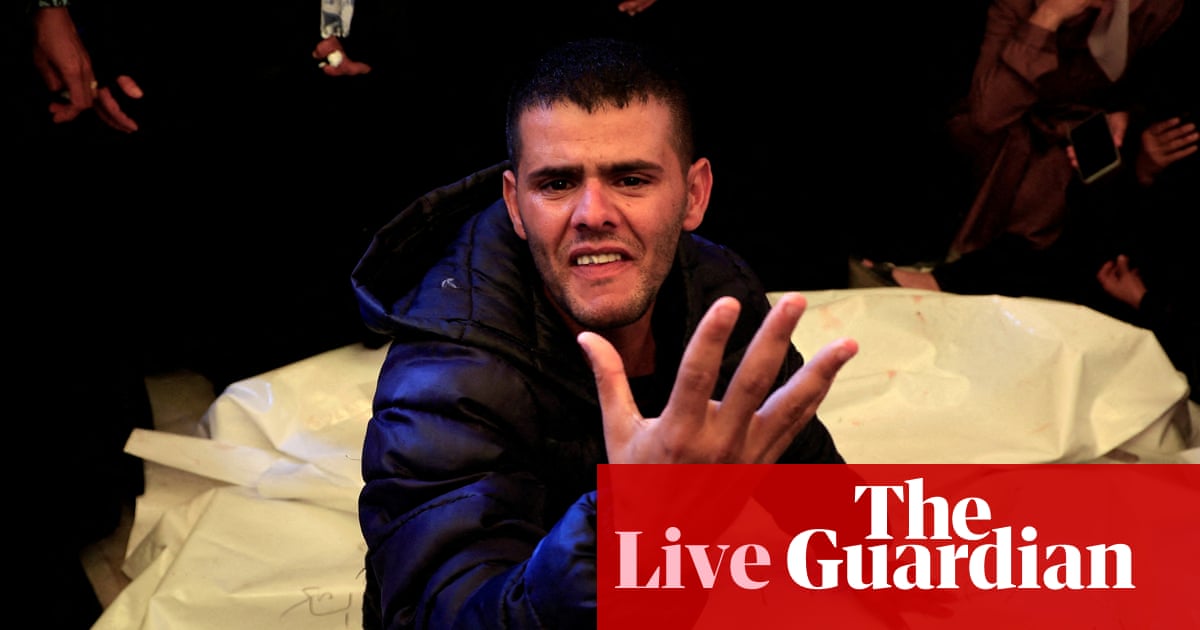At least 101 Palestinian people have been killed in Israeli attacks on the Gaza Strip since dawn,according to Al Jazeera.
Gaza’s civil defence agency said Israeli airstrikes on Sunday killed at least 33 people, more than half of them children.
The Nasser hospital in the southernGazacity ofKhan Younissaid it received the bodies of 20 people who were killed in multiple overnight Israeli airstrikes that hit houses and tents sheltering displaced families in the so-called “safe zone” ofal-Mawasi.
In central Gaza, at least 10 people were killed in two separate Israeli airstrikes, according to the al-Aqsa Martyrs hospital in the town ofDeir al-Balah.
One Israeli airstrike in theZweidatown killed seven people, including two children and four women. The second hit an apartment in Deir al-Balah, killing two parents and their child, the hospital said.
Hundreds of Palestinian people have been killed by the Israeli military since Saturday, including at hospitals and refugee camps.
The attacks are seen by many as part of efforts by Israel to displace Palestinians from the Strip and equivalent to ethnic cleansing as aid into the territory is blocked and residents forcibly removed from their homes.
The relentless bombing campaign came after Israelannounced an intensification of its assault on Gaza late on Friday, in what it claimed was a fresh effort to force Hamas, the Palestinian militant group, to release hostages.
Hamas is believed to still hold 57 of about 250 hostages seized in its October 2023 attack on southern Israel, which resulted in the deaths of about 1,200 people.
On Saturday, Hamas confirmed a new round of Gaza ceasefire talks with Israel was under way in Doha. A group official, Taher al-Nono, told Reuters both sides were discussing all issues without “pre-conditions”.
He added:
Israel is yet to respond publicly to the proposed deal.
Humanitarian officials, meanwhile, say Gazais on the brink of catastropheas food and fuel runs out due to a total Israeli blockade imposed on 2 March, which has also cut off critical vaccines and medical supplies. Stay with us as we bring you the latest developments on Israel’s war on Gaza throughout the day.
As we mentioned in the opening post, there were ceasefire negotiations between Israel and Hamas in Qatar, which has acted as a mediator throughout the war, on Saturday.
According to BBC News, Hamas agreed to release nine hostages in exchange for a 60-day truce andIsraelreleasing Palestinian prisoners from detention.
Citing an official, the outlet reported that the deal would see entry of 400 aid trucks a day intoGazaand the evacuation of medical patients from the devastated territory.
A Palestinian official close to the talks said: “Hamas is flexible about the number of hostages it can free, but the problem has always been over Israel’s commitment to end the war.”
Israel has reportedly asked for proof of life of the hostages who remain in captivity in Gaza. It has not responded publicly to the proposal, but optimism over an agreement is low.
On Saturday morning, Israeli defence minister Israel Katz said in a statement:
At least 101 Palestinian people have been killed in Israeli attacks on the Gaza Strip since dawn,according to Al Jazeera.
Gaza’s civil defence agency said Israeli airstrikes on Sunday killed at least 33 people, more than half of them children.
The Nasser hospital in the southernGazacity ofKhan Younissaid it received the bodies of 20 people who were killed in multiple overnight Israeli airstrikes that hit houses and tents sheltering displaced families in the so-called “safe zone” ofal-Mawasi.
In central Gaza, at least 10 people were killed in two separate Israeli airstrikes, according to the al-Aqsa Martyrs hospital in the town ofDeir al-Balah.
One Israeli airstrike in theZweidatown killed seven people, including two children and four women. The second hit an apartment in Deir al-Balah, killing two parents and their child, the hospital said.
Hundreds of Palestinian people have been killed by the Israeli military since Saturday, including at hospitals and refugee camps.
The attacks are seen by many as part of efforts by Israel to displace Palestinians from the Strip and equivalent to ethnic cleansing as aid into the territory is blocked and residents forcibly removed from their homes.
The relentless bombing campaign came after Israelannounced an intensification of its assault on Gaza late on Friday, in what it claimed was a fresh effort to force Hamas, the Palestinian militant group, to release hostages.
Hamas is believed to still hold 57 of about 250 hostages seized in its October 2023 attack on southern Israel, which resulted in the deaths of about 1,200 people.
On Saturday, Hamas confirmed a new round of Gaza ceasefire talks with Israel was under way in Doha. A group official, Taher al-Nono, told Reuters both sides were discussing all issues without “pre-conditions”.
He added:
Israel is yet to respond publicly to the proposed deal.
Humanitarian officials, meanwhile, say Gazais on the brink of catastropheas food and fuel runs out due to a total Israeli blockade imposed on 2 March, which has also cut off critical vaccines and medical supplies. Stay with us as we bring you the latest developments on Israel’s war on Gaza throughout the day.
